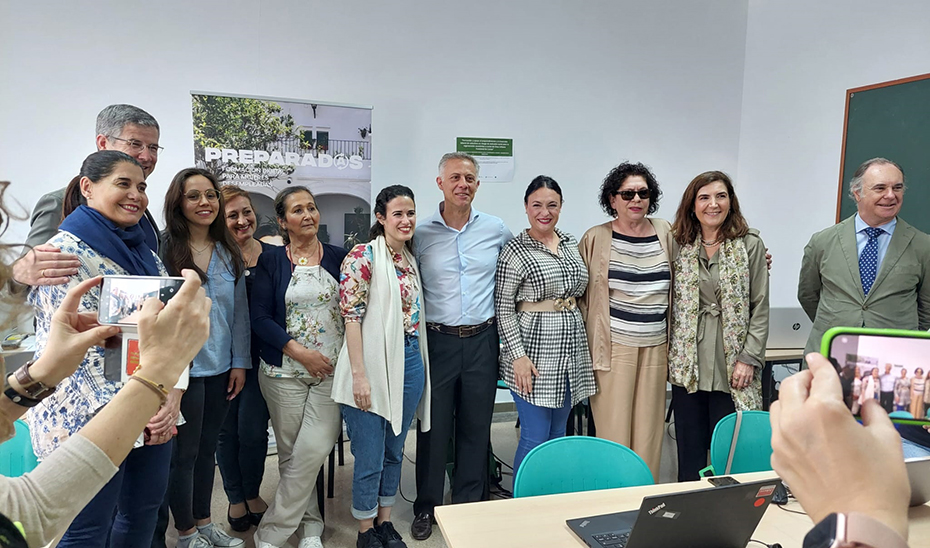-
#3,113 – Semana de la IA: PALOMA

#3,113 – Semana de la IA: PALOMA 19 de abril de 2024 por Craig Shames Actualmente en mi casa tengo que lidiar con palomas molestas que se han instalado en mi balcón y están piando todo el día y toda la noche. Pero pronto todos tendremos que lidiar con PIGEON, una nueva IA que puede…
-
(Actualizado) Notas del parche Hearthstone 29.2.1: cambios semanales en las misiones, actualizaciones de los campos de batalla y corrección de errores

Actualización: RidiculousHat quería dejar claro que esos no son todos los cambios planeados para las misiones semanales. El plan es observar los datos, escuchar comentarios y ajustar el sistema. También están buscando otras soluciones tecnológicas como las “cadenas de misiones”. (Fuente) Creo que esto debería ser parte de las notas del parche si me preguntas,…
-
Más de 26.600 mujeres se han formado en competencias digitales con el programa ‘Preparadas’

La consejera de Empleo, Empresa y Trabajo Autónomo, Rocío Blanco, ha visitado, junto al alcalde de Valencina de la Concepción (Sevilla), Ramón Peña, uno de los cursos que se está desarrollando en esta localidad del programa ‘Preparadas’, destinado a la formación en materia de nuevas tecnologías y de entornos digitales de mujeres del ámbito rural. La consejera ha…
-
Alexander Sorloth cree que Erling Haaland se enfrentaría a un problema al estilo Zlatan Ibrahimovic si fichara por el Real Madrid o el Barcelona

En los últimos años, a Erling Haaland se le ha relacionado con los dos grandes de La Liga, y esto continúa a pesar de que se unió al Manchester City en el verano de 2022. El jugador de 23 años es considerado uno de los mejores delanteros del fútbol mundial y allí No hay duda…
-
Al doilea membru al bandei care a fugit din El Salvador este arestat la Madrid – Știri din Spania

Poliția Națională a arestat la Madrid un presupus membru al grupării autoproclamate Barrio 18, Calle 18 Sau pur și simplu Al 18-lea căutat de autoritățile judiciare din El Salvador pentru infracțiuni de omor, răpire și extorcare, după cum a raportat Ministerul de Interne. Este al doilea membru al acestor bande criminale din țara din America…
-
Himba Tours extrage un rucsac Samsonite – cadouri și mostre gratuite – Știri de agrement

În acest giveaway Tururi Himba Puteți lua un rucsac Samsonite Paradiver Light pentru următoarele călătorii. Rucsacul de voiaj Samsonite Paradiver Light este perfect pentru calatoriile tale, datorita dimensiunii si capacitatii sale. Este usoara, rezistenta si are multa capacitate in interior. De asemenea, este foarte versatil și poate fi transportat în trei moduri: ca geantă de…
-
Teoria incendiilor spontane: mit sau realitate stiintifica?
Există multe controverse în jurul teoriei incendiilor spontane. Unii oameni cred că aceste evenimente sunt doar mituri sau legende, în timp ce alții cred că există baze științifice pentru a le explica. În acest articol, vom explora această teorie controversată și vom încerca să separăm faptele de ficțiune. Incendiile spontane sunt definit fie ca incendii…
-
Insta360 X4 trae imágenes de cámara de acción 8K 360º

¡Apoyanos! Bikerumor puede ganar una pequeña comisión por los enlaces de afiliados de este artículo. Aprende más La nueva Insta360 X4 actualiza su cámara de acción sorprendentemente compacta de 360º para capturar imágenes de 8K, y también agrega procesamiento impulsado por IA y muchas otras funciones divertidas. Al igual que sus competidores, la nueva resolución…
-
Granada cuenta con 17 proyectos de innovación en el ámbito social enfocados a diversos colectivos

La consejera de Inclusión Social, Juventud, Familias e Igualdad, Loles López, ha asistido al ‘Foro Provincial de Innovación Social en Granada’, donde ha destacado el potencial del tercer sector andaluz debido a su entrega con los colectivos más vulnerables, que realizan de la mano de las nuevas tecnologías. Este foro, dirigido a las entidades sociales…
-
El rival de la ciudad, el Inter, y el Milán lucharán por el defensa de primera categoría de La Liga con una cláusula de rescisión de 20 millones de euros

Es probable que el descenso del Almería de La Liga, que ha estado en juego durante gran parte de la temporada, se confirme en las próximas dos semanas. En ese momento podremos empezar a mirar oficialmente la próxima temporada en Segunda, pero antes las ventas probablemente se producirán en el verano. Un jugador cuyo futuro…
